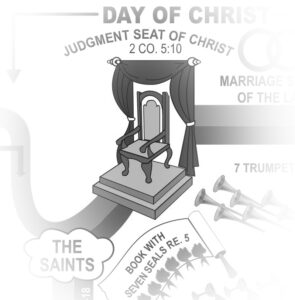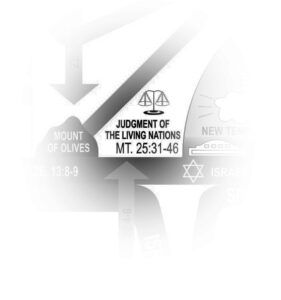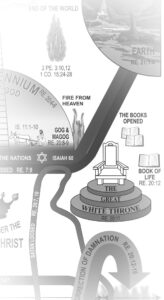 ‘After These Things’ Chapter2.4 Three Judgments – The Judgment Seat of Christ, the Judgment of the Nations and the Great White Throne
‘After These Things’ Chapter2.4 Three Judgments – The Judgment Seat of Christ, the Judgment of the Nations and the Great White Throne
From our book ‘After These Things – Summaries of John Nelson Darby’s Papers on Prophecy – and more…’ Compiled by Daniel Roberts. For more about this book click on the picture or CLICK HERE
2.4 Three Judgments
There are three distinct occasions of judgment.: The Judgment Seat of Christ, the judgment of the nations (or of the living) and the Great White Throne.
They are at different times, for different subjects with different outcomes. Christians often confuse these. One thing is common to all – the Judge is Christ.
The Judgment Seat of Christ
All those who will have been Raptured or raised when the Lord comes to take His own will experience this. Hopefully, this includes you, dear  reader.
reader.
Though scripture is not specific as to timing, the judgment seat of Christ will doubtless be the first thing that the believer in Jesus will experience following the Rapture. It must be between the Rapture and the marriage of the lamb.– maybe as we are changed into our bodies of glory ‘In a moment, in the twinkling of an eye, at the last trump: for the trumpet shall sound, and the dead shall be raised incorruptible, and we shall be changed’ (1 Corinthians 15:52).
It is a great blessing that we shall be with Jesus and have exactly His view on everything in our lifetime. 2 Corinthians 5 tells us, ‘For we must all appear before the judgment seat of Christ; that every one may receive the things done in his body, according to that he hath done, whether it be good or bad’ (v.10). The word ‘appear’ in Greek is φανερόω/phaneroó/Strong-5319, meaning, ‘make clear or manifest’. So it is not like appearing before a court with prosecution and defence. It is more, seeing everything in our lives, good and bad, just as Jesus saw it. The thought of a judgment-seat comes from the Greek tradition. The word used is βῆμα/bēma – a step or foot (up). A judge or umpire would sit on a raised platform and would adjudicate. It is like the umpire in a tennis match.
The important thing for us is that the Judge is also our Saviour, and what abounds is mercy. Our time of responsibility will have finished. There will be no guilt and no penalty. Any idea of a period of purgatory is foreign. Look at it from the Lord’s point of view. He has finished the work, His church is complete, His bride is ready, He wants the marriage to take place immediately – ‘The marriage of the Lamb is come, and his wife hath made herself ready’ (Revelation 19:7). We will be able to enjoy the Lord’s presence eternally, and the Lord will enjoy His bride in her perfection.
The only other direct reference to the judgment seat of Christ is in Rom 14:10 ‘But why dost thou judge thy brother? or why dost thou set at nought thy brother? for we shall all stand before the judgment seat of Christ’. Here it is a question of judging our brother (or sister). The message here is that we should have good relationships with the Lord and with our brethren now, so that no adjustment will be necessary at the judgement seat.
The following hymn brings the positive aspects of the judgment seat of Christ:
- What will it be with God to dwell,
- And there to gaze on Jesus’ face!
- To meet the One, we’ve known so well
- As Priest and Saviour – in that place!
- Before Christ’s judgment seat to stand,
- With Him look back on all the way;
- To learn the meaning, at His hand,
- Of every deed in every day!
- Clearer than ever shall we see
- The grace which God our Saviour showed,
- The love that led so faithfully
- Along the pathless desert road.
- How blessed when this time is o’er,
- To find that love had all-sufficed,
- As there upon the heav’nly shore
- We reach the day of Jesus Christ.
Maria Carlsson-Carrèn (circa 1865-1955)
Little Flock Hymn Book No 299
The Judgment of the Nations
 The judgment of the nations (or judgment of the living) is an event that will occur seven years after the Rapture, immediately following Armageddon and the Second Coming of Christ to the earth. As the Lord sets up His earthly kingdom, His first order of business is to judge the nations and eliminate the unsaved from entering the Millennium.
The judgment of the nations (or judgment of the living) is an event that will occur seven years after the Rapture, immediately following Armageddon and the Second Coming of Christ to the earth. As the Lord sets up His earthly kingdom, His first order of business is to judge the nations and eliminate the unsaved from entering the Millennium.
These scriptures are often incorrectly applied to the gospel. For example, the scripture quoted above in Matthew 25 ref Zephaniah 3:17ers directly to the judgment of those living on the earth – not to the Great White Throne. The same applies to the scripture in Joel, ‘Multitudes, multitudes in the valley of decision: for the day of the LORD is near in the valley of decision (Joel 3:14). Sometimes it is misapplied to our making a decision; sometimes to the Lord judging those who are saved and those who are not. If we are alive at the Rapture, this judgment does not apply: either we are saved and will be Raptured and have the judgment seat, or we are lost are not raised until after the Millennium and condemned to hell as unbelievers.
At the judgment of the nations (which also includes the Jews), there are four parties:
- The sheep – the saved or righteous believers
- The goats – the lost wicked unbelievers
- The brethren – believing disciples – messengers of the glad tidings
- The Judge – Christ Himself
People are judged according to how they had received these messengers, whether well or ill, as though it had been done to Himself – see the full passage in Matthew 25:31-46. They had been predestined but were seen as righteous by God. Those who despised the testimony and those that bore it had despised the King who sent them; they should go away into everlasting punishment. The sheep will love and help the brethren because they appreciate the message of the gospel brought to them by the ‘brethren’. The goats, who reject God’s timely message, will show indifference and hatred toward the ‘brethren’.
But for the saved the judgment of the nations will be a wonderful day. Zephaniah 3:17 says, ‘The Lord thy God in the midst of thee is mighty; he will save, he will rejoice over thee with joy; he will rest in love, he will joy over thee with singing.’
In Matthew 25:41,46, we have the awful condemnation of the unsaved. ‘Then shall he say also unto them on the left hand, depart from me ye cursed, into everlasting fire, prepared for the devil and his angels:’ and ‘…these shall go away into everlasting punishment: but the righteous into life eternal.’ Likewise, in Zephaniah, God intends to assemble the nations, and pour upon them His indignation – a terrible judgment. ‘Therefore wait ye upon me, saith the Lord, until the day that I rise up to the prey; for my determination is to gather the nations, that I may assemble the kingdoms to pour upon them mine indignation’ (Zephaniah 3:8)
The Great White Throne
 This event is the solemn final judgment. It will take place after the Millennium. Satan will have been released ‘for a little season’, during which time he will have deceived and gathered the nations against the camp of the saints, only to be devoured by fire from heaven.
This event is the solemn final judgment. It will take place after the Millennium. Satan will have been released ‘for a little season’, during which time he will have deceived and gathered the nations against the camp of the saints, only to be devoured by fire from heaven.
Then:
- Satan will be cast into the Lake of Fire.
- The dead will be judged and condemned,
‘And the devil that deceived them was cast into the lake of fire and brimstone, where the beast and the false prophet are, and shall be tormented day and night for ever and ever. And I saw a great white throne, and him that sat on it, from whose face the earth and the heaven fled away; and there was found no place for them. And I saw the dead, small and great, stand before God; and the books were opened: and another book was opened, which is the book of life: and the dead were judged out of those things which were written in the books, according to their works. And the sea gave up the dead which were in it; and death and hell delivered up the dead which were in them: and they were judged every man according to their works. And death and hell were cast into the lake of fire. This is the second death. And whosoever was not found written in the book of life was cast into the lake of fire’ (Revelation 20:10-15).
‘But the fearful, and unbelieving, and the abominable, and murderers, and whoremongers, and sorcerers, and idolaters, and all liars, shall have their part in the lake which burneth with fire and brimstone: which is the second death’. (Revelation 21:8).
Earth and heaven flee – the dead have no escape. They have refused the gospel of the grace of God and are judged in their sins. Their works, however good cannot save them. Moreover, they must ‘confess that Jesus Christ is Lord, to the glory of God the Father’ (Phil 2:11).
Need I say more? May this not be the portion of any reader of this book! ‘Believe on the Lord Jesus Christ, and thou shalt be saved’ (Acts 16:31)

